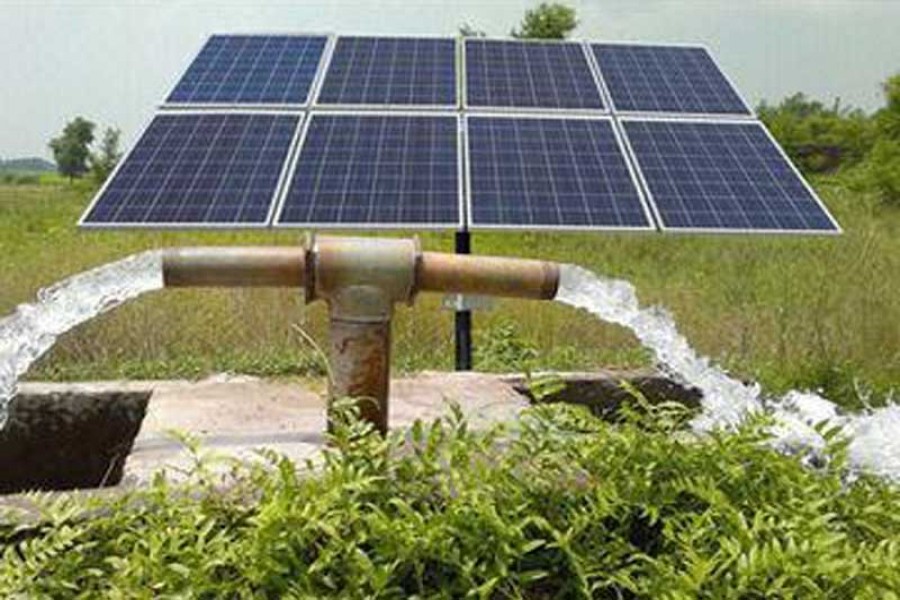
Published :
Updated :

Use of solar pumps in irrigation -- if made widely available across the country-- would revolutionise the country's irrigation system. Absence of a viable alternative to diesel to reduce the cost of irrigation in the country has seen an unaffordable rise in the costs of cultivation. Concerned quarters, including farmers, are finding it increasingly difficult to rely either on diesel or grid electricity as a secure and affordable means of providing the much-needed water for irrigation, particularly in the dry season. While grid electricity has so far remained largely uncertain and out of reach in many parts of the country, the price of diesel makes cultivation very costly. A respite, against this backdrop, appears to be in sight as there is currently a move to introduce solar power-propelled irrigation.
The government of late signed a $10 million grant agreement with the World Bank, as part of a total commitment of $24.5 million, to introduce solar irrigation pumps for farmers. A project under the multi-donor financing is in place to enable installation of more than 1,300 solar powered irrigation pumps covering more than 65,000 bighas of land for rice cultivation. Aimed at providing farmers with clean energy at considerably lower costs compared to diesel, this project is designed to replace diesel pumps with solar irrigation pumps in areas where grid electricity has not reached. It has been learnt that 1,300 solar irrigation pumps to be installed in phases under the project would save the country $3.2 million in foreign currency annually. Needless to say, large-scale use of solar powered irrigation pumps will substantially reduce the country's diesel imports. Besides, as a result of the use of clean and renewable energy, carbon emission is expected to be reduced by 10,000 tonnes every year. Private sponsors will be responsible for installing, operating and maintaining the solar pumps, while donor financing will provide up to 30 per cent in concessional credit. Private sponsors are expected to provide 20 per cent of the pump costs as equity.
Solar energy, believed to be one of the most secure and low cost sources of electricity, has begun to be used in the country's rural households for quite sometime now, thanks mainly to the efforts of non-government organisations (NGOs). In a country like Bangladesh with abundant sunshine for most of the year, sourcing energy from the sun rays should be a fittingly gainful experience for irrigation purposes. Since the need for water is the highest on hot sunny days, the technology is an obvious choice.
Solar powered pumps are extensively used in the African continent. Once a very expensive technology, prices have reportedly dropped in recent years because of wider use and rebates provided by governments. In the Indian states of Gujarat and Karnataka, solar pumps are mainly responsible for revolutionising cultivation because of uninterrupted supply of water for irrigation at affordable costs. In Bangladesh, installation of solar pumps at the initial stage may be costly but according to experts, extensive use will cut costs to a level far below the diesel costs. There is thus the need to popularise the technology, as well as attract investment in research and innovation to bring down the costs.


 For all latest news, follow The Financial Express Google News channel.
For all latest news, follow The Financial Express Google News channel.